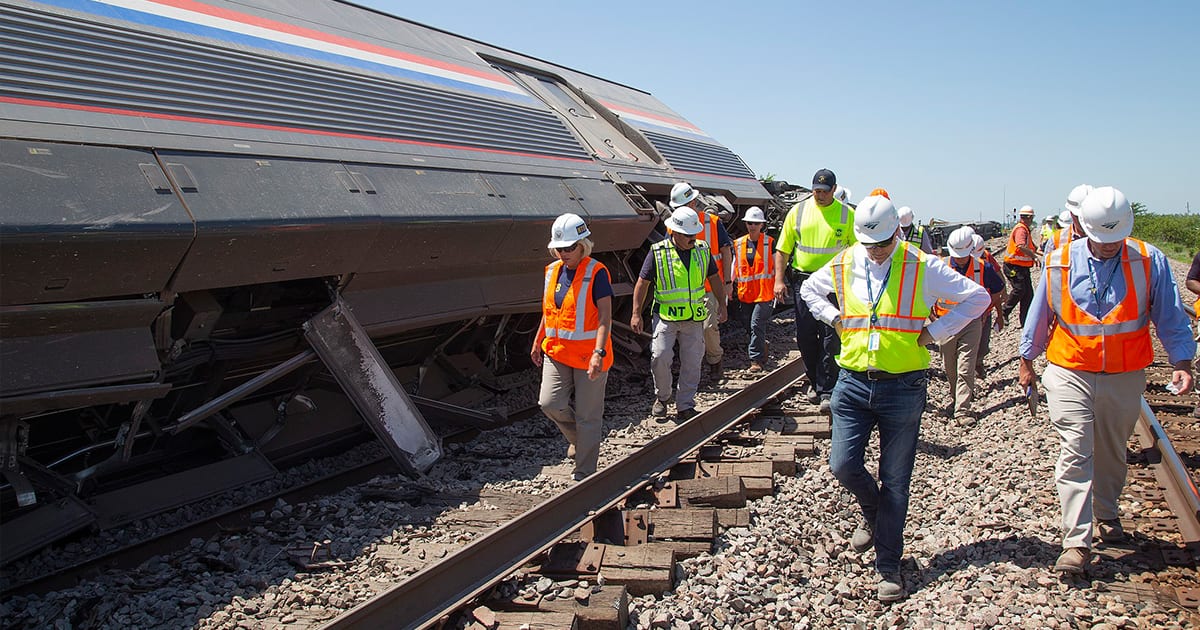
By Cheryl Magness
On June 27, at approximately 12:42 p.m. CDT, an Amtrak train carrying 275 passengers and 12 crew members derailed in the small town of Mendon, Mo., located about 100 miles northeast of Kansas City. The train had been en route from Los Angeles to Chicago. The investigation is ongoing, but initial reports attribute the derailment to the train’s collision with a dump truck that was attempting to cross the track. Eight passenger cars derailed, along with two locomotives, and four people have died, including three passengers and the dump truck driver. The National Transportation Safety Board reported that at least 150 people were treated at 10 area hospitals.
The Rev. Karl Gibbs, pastor of Immanuel Lutheran Church in Carrollton, Mo., was called to assist with the emergency response. Gibbs, who lives and works about 30 miles from the scene of the derailment, recently began serving as a disaster response chaplain for the Missouri State Emergency Management Agency (SEMA). The SEMA chaplaincy program is relatively new, but Gibbs has extensive experience as a chaplain. While studying for the pastoral ministry at Concordia Seminary, St. Louis, he completed a unit of Clinical Pastoral Education at Barnes-Jewish Hospital in St. Louis, and served as a PRN (pro re nata — “as the situation demands”) chaplain throughout his four years at seminary.
During that time, he primarily worked overnight shifts in the trauma room. Since leaving seminary, he has sought opportunities to continue serving in crisis situations, including with Lutheran Church Charities and Lutheran Early Response Teams (LERT) in both the LCMS (Lutheran Church—Missouri Synod) Central Illinois District and the LCMS Missouri District. He currently serves as the Missouri District’s assistant district disaster response coordinator.
‘Ministry of presence’
When he received the call about the Amtrak derailment, Gibbs was on his way home from a meeting with LCMS Disaster Response leaders at the LCMS International Center in St. Louis. The meeting was about developing new resources to minister to people whose community has gone through a traumatic situation.
“The event in Mendon was actually our first deployment since [the SEMA chaplaincy program] was formed,” Gibbs said. “Normally, I would have been only 30 minutes away, but since I was on the road, it took me a bit longer to get to the scene.
“By the time I arrived at the school in Mendon that had been set up as an emergency shelter, most of the passengers had already been transported to area hospitals or hotels for the night. However, there were still many first responders present. Another SEMA chaplain and I spent that night visiting, conversing and praying with many of those who had responded to the horrific scene that day.”
Gibbs said that his most important role as a chaplain at such times is to provide a “ministry of presence.”
“Trauma experts will tell you that the greatest part of healing from an event like this comes from simply talking about it. … What I will often say to folks who are struggling with the images they have seen, second-guessing their actions in the moment or otherwise having difficulty is that what they are experiencing is a normal reaction to a very abnormal experience. … I do a lot of listening.
“I also pray. I always ask those I’m with if I can pray with them. In 15 years in crisis response and hospital chaplaincy work, I have never had anyone decline. It is a wonderful way for folks to hear of the blessed truth that even when their world is falling apart, God remains as their ‘mighty fortress’ [Psalm 46].”
The Rev. Dr. Ross Johnson, director of LCMS Disaster Response, said that Gibbs is one of many LCMS pastors who provide chaplaincy support in their communities when disasters or other serious events take place.
“For almost 20 years, LCMS Disaster Response has been developing LCMS laity and pastors to offer whole-person care, helping victims both with physical needs and spiritual needs,” Johnson said. “Pastor Gibbs exemplifies the importance of Christian spiritual care in times of tragedy. His leadership and demonstrated training in the aftermath of the derailment are the very outcomes toward which LCMS Disaster Response aims — striving to make the best use of the generous financial, prayer and volunteer support of thousands of LCMS contributors.”
Following the derailment, Gibbs took part in a critical incident stress debriefing with first responders. “Chaplains serve as an integral part of these debriefings,” Gibbs said. “During them, people are often asking the hard questions regarding God’s role in suffering. They — especially our 911 dispatchers — see and hear things that no one ever should. They and their families sacrifice so much for the rest of us, yet seldom have anyone with whom to process everything they have experienced. I’m honored to be there to listen, offer encouragement and, when requested, pray with them. As a pastor, I can come alongside and show them the compassion and love of Jesus.”
Gibbs will also be available, if needed, to offer support to passengers and crew members who remain hospitalized. “Along with the other disaster response chaplains, I will be honored to respond and to serve however I can,” he said.
Asked what the people of the LCMS can do at this time, Gibbs said, “I would encourage folks to keep the families of those who died, as well as the surviving passengers and crew and the first responders, in their prayers — that healing would be granted, and that the message of comfort and peace found in Jesus may fill the hearts and minds of those affected by this horrible tragedy.”
Posted June 30, 2022/Updated Feb. 28, 2023